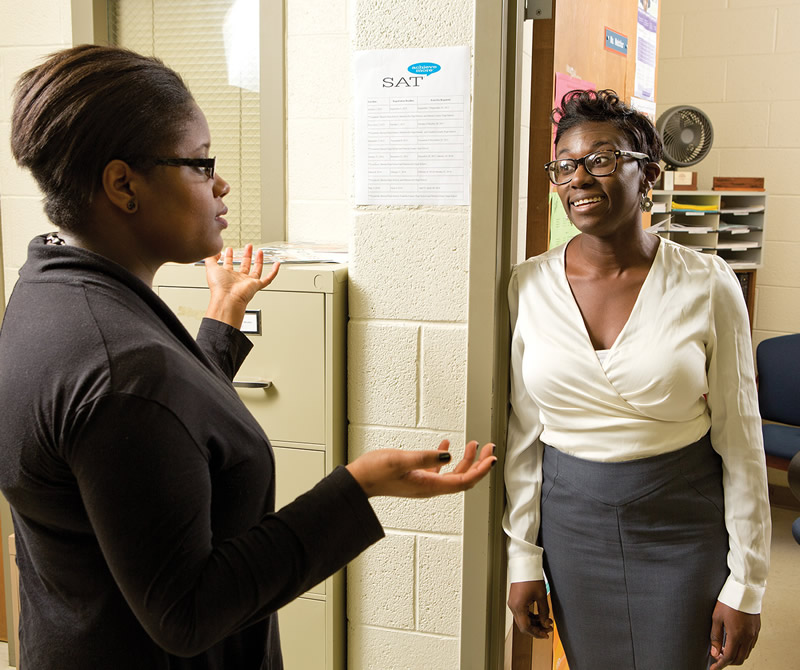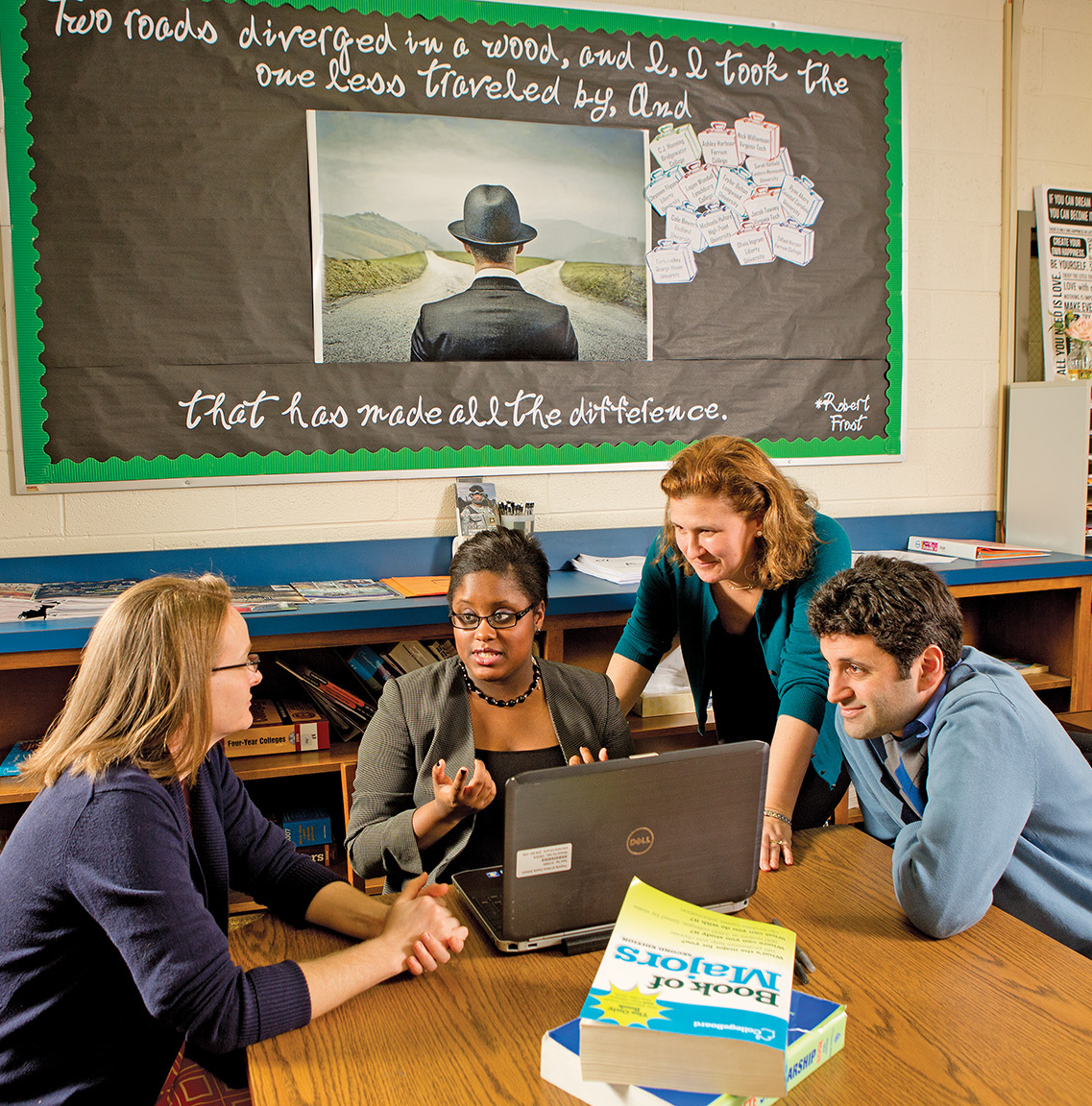When a young woman returns to a place of painful experience — bullying, debilitating shyness, financial problems and low self-esteem — there are bound to be strong emotions. For Erica Elder, who came home to Bassett High School in southern Virginia last fall to be a college adviser and mentor, the first day back was, well …
“At first it was really weird, walking into school as faculty,” Elder says.
Three years after earning a high school diploma from Bassett, Elder had returned a different person. For one thing, she had a bachelor’s degree from the University of Virginia. Simply being accepted into one of the nation’s most prestigious universities defied every expectation she’d had for herself only a few years earlier. At the time, mired in desperation, she couldn’t conceive of graduating from an elite university in three years. And the notion that she would come back to help kids not much younger than herself to defy similarly low expectations would have been, in Elder’s words, weird.
“I really wanted to go to college, but I felt too stupid,” says Elder, recalling her outlook for much of high school. And yet she succeeded, largely because a kind and competent mentor told her that she could — and showed her how. “He helped me a lot. I needed somebody to tell me I could go to school,” says Elder.
She is one of nearly 400 young men and women on the front lines of the College Advising Corps, a fast-growing “near-peer” mentoring program. Founded in 2005, CAC recruits and trains recent college graduates and embeds them in high schools across the country with high concentrations of at-risk students. CAC has two primary missions. The first is to increase the number of low-income, first-generation and underrepresented students entering and completing college. The hope is that they will “fulfill their potential through education,” says Nicole Hurd, CAC’s founder and CEO. “The job of an adviser is to be a messenger of hope.”
“What seem like little process barriers (filling out financial aid forms, understanding the admissions calendar, applying for scholarships and fee waivers, visiting college campuses, etc.) become huge because students don’t know how to navigate the process,” Hurd says. “The power of the model is having near-peer advisers saying, ‘If I can do it, you can, too.’”
Students who come from outside the college-going mainstream face an uphill climb to postsecondary success regardless of intelligence or their ability to do college-level work. Only about 3 percent of students attending the country’s 140 most selective postsecondary institutions are from families in the bottom fourth of the income scale. When those students graduate, CAC comes calling, actively recruiting them as mentors. Nearly three-fourths of CAC advisers are from under-represented populations; 32 percent are African American, 30 percent Latino, 63 percent Pell Grant-eligible, and 54 percent are the first in their families to go to college.
“They really understand the barriers because they made it to the finish line themselves under similar circumstances,” Hurd says. “Research shows that the most influential people in a young person’s life are their peers. The messenger matters.”
State-specific training
Before beginning her two-year assignment as an adviser at Bassett High School, Elder underwent four weeks of intensive training at the University of Virginia, which serves as CAC’s chapter headquarters in the state. The program’s structure ensures that it has at least one university sponsor in each of the 14 states where it now operates. “Our training is very state-based,” Hurd says. “Getting into college in Virginia is very different from getting into college in Texas.”
CAC’s summer training program encompasses topics from college essays and financial aid to SAT/ACT preparation and personal finance. Trainees visit colleges throughout the state, meeting admissions officers they can turn to later, when students encounter problems. By the end of the month-long training, advisers learn that “their best resource is each other and former advisers,” says Joy Pugh, director of the Virginia CAC. A local philanthropic organization, the Harvest Foundation, has covered the cost of CAC and advisers in Henry County since the program’s inception.

Elder learned that the student’s GPA wasn’t good at all, and like many of the school’s seniors, he hadn’t taken the SAT or the ACT. “I was going to have my first hard conversation,” she says. Growing up in Henry County, on the North Carolina border, Elder knew about hard conversations.
The county is home to Martinsville Speedway, the only NASCAR track in continuous operation since the racing circuit began in 1948 — back when the region had been a thriving, twin-engine industry town. Bassett Furniture was at the center of what was then a booming furniture industry; area textile mills were humming. All of that changed long before Erica Elder came of age. Today, the furniture trade is a shadow of its former self, and shuttered apparel factories dot the area landscape. In 2003, even the local minor league baseball team, the Martinsville Astros, left town, relocating to Greeneville in 2004.
“My dad was always changing jobs,” Elder recalls.
She had challenges of her own. As a freshman at Bassett, Elder “had really low self-esteem. … I was just trying to get by, but I was really good in math and science,” she says. She aspired to college, dreaming of Harvard, maybe Yale. “I had been looking at colleges since middle school … looking but not really understanding. I heard you had to be rich to go to college.”

The Elders weren’t rich. To help with expenses, young Erica worked the snack bar at the Roll-A-Bout Skating Center. At one point, the Elders considered moving to Richmond, where they had relatives, as a way to save money. “It was devastating,” recalls Elder, though at least she said she’d “gotten to a point where the bullying had finally stopped.”
Despite the upheaval, she moved ahead with the college process, taking the SAT in her sophomore year. “I did terrible on it,” she says. Subsequent attempts yielded little improvement. She attended a youth fair and had a discouraging encounter with a man at the “college options” booth. The stranger, someone Elder presumed to be a person of authority, asked Elder about her college plans. She mentioned some state institutions she was considering — the University of Virginia, Virginia Tech, Ferrum College, about 40 minutes north of Bassett. He asked about her SAT scores, which she divulged. “He was like: ‘There is no way you can go to college right out of high school,’” she recalls. “That wasn’t good at all. I immediately assumed I couldn’t do it.”
Elder shut down. She avoided the high school’s guidance counselors and sought what seemed a more attainable career path. “The military is big around here,” says Elder, so she took the Armed Service Vocational Aptitude Battery. “I did really well.”
Distrust of ‘experts’
It was here, at this crossroads, that Elder met Ethan Jorgensen-Earp, a CAC adviser who had been assigned to Bassett High School to help students like her. At first, she was leery of him. “I didn’t want to talk to any other ‘experts’ about college,” says Elder. “I was ashamed of my (SAT) scores.”
When they finally met, Jorgensen-Earp “was friendly … he gave me direct eye contact, he listened to what I had to say,” she recalls. He assured Elder that her scores weren’t that bad. “I immediately felt comfortable with him,” says Elder. She relented and told him her scores. He expressed confidence that Elder’s SAT scores were good enough for her to get into some of the colleges she was considering. She had a good GPA. “Just him telling me that I could do it” changed her outlook — and her direction, Elder recalls. She began the college-application process.

The emotional roller coaster ride continued when she submitted her FAFSA and learned that her family’s estimated contribution was much higher than she had expected. “I was like: ‘Here we go again. I can’t go to school.’ I almost cried. Hearing anything about money automatically made me sad.”
Jorgensen-Earp helped quell that despair. He met with Elder’s parents and explained options for paying education expenses. They formulated a plan that would allow their daughter to attend the University of Virginia without imperiling family finances. Elder, whose younger sister is now enrolled at Virginia, graduated with total student loan debt of $13,000.
Having received so much help from her mentor, Elder wanted to pass it on. That’s how she ended up back in Bassett, preparing to have that “hard conversation” with a student who lacked the grades to attend a four-year college straight out of high school. Elder, who has been trained to help students find colleges that are good fits — academically and socially — told the young man about a guaranteed transfer program that would assure him admission to his college of choice if he attended a community college for two years and posted a 2.8 grade point average. “He was fine with that,” Elder says. “That experience gave me the confidence to talk to more students.”
At other times, she tells students to aim higher. Austin Wright, a fourth-generation south Virginian, had decided to go to a community college close to home, even though his GPA and test scores were excellent. “Around here, leaving your parents is a big deal,” says Elder, who encouraged Wright to broaden his college choices. “She pushed a little bit,” admits Wright, who applied to Radford University, 90 minutes northwest of Bassett, and East Tennessee State, three hours west. “Whatever I needed to know, she was there to help.”
Elder makes presentations to groups of students and counsels them individually. She attends after-school sports events because advisers are most effective when they are “completely integrated into the community,” Hurd says.
Elder also helps Bassett’s overworked guidance counselors keep up with a demanding workload. Simply filing paperwork to waive fees for SAT and ACT tests is a challenge when 60 percent of students qualify for free or reduced-price lunches. “It is almost impossible for a school counselor to register that many students alone,” says Shekila Yralux, the senior counselor. “She helps me to offset that. We work really well together as a team.”
CAC’s advisers are having an impact. In Virginia, the “vast majority” of high schools with CAC advisers are sending more kids to college, Pugh says. Between 2008 and 2012, among graduates of those numerous CAC high schools where the college-going rate increased, that rate went up by at least 2 percentage points — and as much as 14 points, Pugh says. In North Carolina, students from CAC high schools had a first-to-second-year persistence rate of 88 percent during the 2012-2013 academic year. Among students from high schools with no CAC adviser, the persistence rate was 82 percent.
In addition to helping underserved high school students to make good college choices, CAC’s other primary mission is to provide advisers “a transformative experience,” Hurd says. A survey of former advisers at Virginia high schools found that 91 percent of them gained skills and competencies that assisted them professionally; 92 percent had their next position, whether employment or graduate school, within three months of completing their two-year advising commitment; and 88 percent were satisfied or very satisfied with their next career step. “They’re not the same people after two years,” Hurd says. “It’s awesome to watch how much they grow.”

